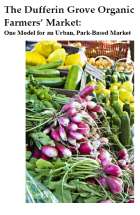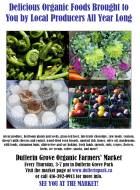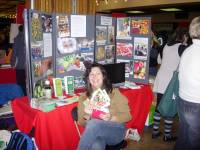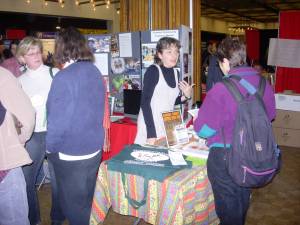
Pages in this Folder:

Related Folders:
See also Department Site Map
Publications:
Market-related videos
Comments?
For the basics, see
- Website & Privacy Policies
- How To Get Involved
- The Role of the Park
Search options:
Department Site Map
Custodians:
posted January 30, 2008
Remarks From Guelph Organic Conference Public Forum
Guelph Organic Conference Public Forum: "Organic, Fair Trade, Local: All of the Above or None of the Above?"
A Brief Introduction from the Farmers' Market Perspective - by Anne Freeman
The farmers' market at Dufferin Grove has been around for five years. Not that long, but already it feels like the world has shifted a lot in relation to the issues around local, organic and fair-trade food.
Five years ago, "eating local" wasn't being talked about very much; far too little, in fact. Organic, however, was much more in the air, so when Jutta Mason found local farmers who could bring a strong selection of organic foods to our neighbourhood, it captured quite a bit of interest.
Some of our early customers were already fans of these farmers from Riverdale Market, or people who missed the little organic market that used to run on Markham Street, but many were meeting local farmers for the first time. Gaining some understanding of how they farm, and the farmers' challenges, certification among them (I should mention here that not all of our farms are certified, particularly some of the small meat and cheese producers) has been a great learning opportunity. Along with enjoying the warmth coming from the wood-fired ovens--our special heart--gradually more and more people got excited about supporting the farmers, and other farmers and many city-based food producers asked to participate. It's been great to see how people come together around food.
Because we've always included city-based vendors as well, fair trade seems like a natural fit in this picture.We had a lot of "thoughtful eaters" coming together, people wanting fairness for local farmers, so for those foods that can't come from close to home, the awareness of fair trade issues is there. However, I can't say, in hindsight, that sales at the market have been great in the fair-trade category. I don't think that's from lack of interest, but at the market priority generally goes to the items you can't buy later or find anywhere else.
One exception I'd like to mention, though, is the "co-producers" who call themselves Chocosol. They're involved in what they call "horizontal trade" with cacao, amaranth and coffee growers in Oaxaca, and what they're emphasizing with horizontal trade is relationships that go beyond economic fairness to collaboration. I see a lot of willingness on the part of customers to try new foods and participate as part of this venture. It's a level of engagement that's beyond labels, and when we talk about what makes farmers' markets meaningful to people, it is those face-to-face connections, the chance to ask questions, and to feel part of something.
Because of the relationships that develop, we have some amazingly loyal customers. The backbone of the market is people who come in just about all weather, and buy a good part of their basic food for the week from our producers.
We are a year-round market, and being there all 12 months keeps the commitment from those regular customers strong. There isn't that big shift back to the supermarket all winter, or the slow startup time in the spring when people haven't got back in the habit. While some farmers only participate for peak season, many need opportunities for 12 months, and as well as supporting our meat, dairy and other producers who have food to sell year-round, we want to offer produce farmers plenty of incentive to add more storage, work on season-extension, try value-added and new crops. But while you can eat fully locally and very well these days from the market, we're still only part of the way there on the local supply.
When we reach the lean season, we still do have to keep customer numbers high enough through offering a wide selection, to be sure it's worth the farmers' trip into the city. For that reason, from the start, we've had some of our farmers supply us with non-local organic produce in addition to their own when the local selection becomes limited, and in a much smaller way within the growing season (primarily fruit, when it's in very short supply). So long-distance organic is a tool for us to boost local organic, and it has been tough to see that villainized. There is no deception intended, and local always takes priority--that is a rule. As people with efficient connections with local distributors, these farmers are providing us with a service that strengthens the market, while stabilizing their own business somewhat through the winter. We figure the fraction of our customers' diets that is local stays a lot higher if we keep them coming, even if they buy some lemons or bananas. So even though we hope to move closer to all local-produce, we're not ready to set the bar at 100%, And this year, the growing demand for local has made it a greater challenge.
In 2007, 6 new markets opened in Toronto, plus one in Oakville--that's a remarkable year, and I'm worried that I'm going to lose track of how many groups I've heard from already in 2008 who would like to have markets in other neighbourhoods. While I can't speak about what's happening over at WalMart, or in the cross-border shopping lineups, at the market we are seeing a real fervour around local eating, and local organic is the jewel in the crown. Of the seven markets new last year, five have a substantial commitment to organic and ecologically sustainable farms, and other markets, older ones too, are recognizing that including organic vendors is very valuable. In fact, I've noticed that there can be a-- mistaken-- assumption on the part of some customers that "farmers' market" means "organic market". So organic farmers who are willing to bring food to the city are hotly sought after.
At Dufferin, we didn't lose a lot of customers as a result of more markets opening last summer. We had a terrific outdoor season. But this winter we are seeing a bit of a setback in our progress in building year-round local. Since all the produce growers took on more summer markets, that meant more demand for everything they could grow, and a real stretching of resources--mainly time. There was less time to work on additions like new hoop houses for season extension, and less chance to can or freeze for winter. One of our main growers started his winter break a month earlier than other years, because his storage crops sold out faster than before. If we had jumped on the "nothing but local" bandwagon, we would have a serious "Hungry Gap" ahead of us, which would really destabilize the market. We need to keep some patience in building this. These are growing pains, but they're not the worst kind. Everybody is very optimistic about 2008. Just about every week I feel the need to talk to the growers about how much they plan to have for us at this time next year. Two more markets, The Green Barn Market at Wychwood in 2008, and The Brickworks maybe the following year, plan to become year-round. There are a lot of people cheering for our local organic producers and hoping more farmers will join them. While it won't happen overnight, there's a goal to aim for: twelve-months of local, organic, fair food.
|
Read more News. | ||





 Printer friendly version
Printer friendly version

